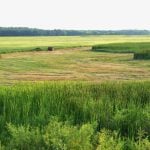REGINA – To judge or be judged was the challenge for young people entering the commercial cattle competition at Canadian Western Agribition from Nov. 21-28.
Working with commercial judge Will Lowe of Northwest Consolidated Beef at Strathmore, Alta., the 30 youngsters were taught how to judge commercial cattle like professionals in settings similar to what they would see at an auction and how to select feedlot cattle for the domestic or the United States market. The Agribition program is open to young people aged 9 to 21 and includes $500 in scholarship money.
Read Also

Alberta rancher finds success with virtual fencing
Increased use of virtual fencing in cattle industry in Canada showcased at Innovation on the Range in Southern Alberta.
Lowe has worked with 4-H groups before but this was his first time at Agribition as a commercial judge.
“I was happy with the way they placed the cattle,” he said after the show.
For 16-year-old Julie Hextall of Grenfell, Sask., it was a learning experience.
“It’s a different type of judging than we do in 4-H. I think I prefer doing showing and showmanship,” she said.
Hextall lives with her parents, Kim and Jack. The family raises purebred and commercial Angus cattle. They placed third in class at the bull pen alley competition where pens of three commercial bulls are shown and assessed for uniformity and breeding quality.
“There are lots of leaders here and it is a good reason to be in the alley and compete with them,” said Bree Patterson, who hopes to start her own cattle operation in British Columbia.
Patterson and three other students from Lakeland College at Vermilion, Alta., entered a pen of five open commercial heifers. It is a futurity competition where the same group of cattle could return and compete next year. The pen placed second.
Livestock and animal science technology farm manager Blake MacMillan said the event shows youth the key differences between show animals and commercial animals.
“It is really easy to bring a fat heifer to Agribition and win but they don’t necessarily make a good cow,” he said.















